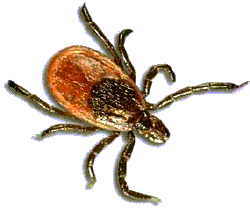|
WASHINGTON
(Reuters) - Want to avoid ticks? Avoid sitting on logs, experts advised
on Thursday.
Researchers at the University
of California, Berkeley, used themselves as bait to see where the greatest
risk of picking up a tick was, and found logs were the worst places to
sit.
"We sat on logs
for only five minutes at a time, and in 30 percent of the cases, it resulted
in exposure to ticks," said Robert Lane, a professor of insect biology
who led the study.
"It didn't matter
if we sat on moss or the bare surface; the ticks were all over the log
surface. The next riskiest behavior was gathering wood, followed by sitting
against trees, which resulted in tick exposure 23 percent and 17 percent
of the time, respectively," Lane said in a statement.
Writing in the Journal
of Medical Entomology, Lane and colleagues said they were looking for
ticks carrying Borrelia burgdorferi, the bacteria that cause Lyme disease.
"If we're going
to develop effective strategies and educational programs for the prevention
of Lyme disease, it is critical that we understand how people are exposed
to the ticks that transmit the bacteria in the first place," Lane
said in a statement.
"We intentionally
looked at behaviors that people would typically engage in while spending
time in the woods."
Sitting in leaves was
not especially risky, they found.
The damper the leaves,
the more likely they are to harbor ticks in all their life stages. Ticks
retreat down to the ground at night, so laying out to watch the stars
or spending the night camping in a clearing isn't going to assure you
a tick (or nymph or larval) free night...
|
